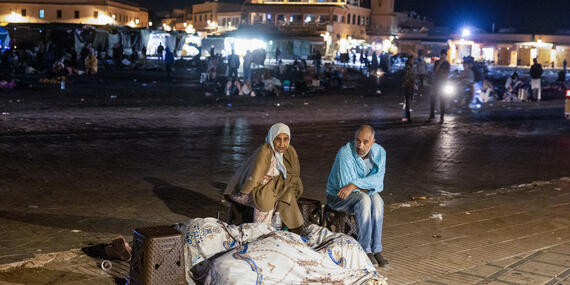Today's top news: Morocco, Syria, Sudan, Ukraine

Morocco
Some 2,500 people have lost their lives and some 2,500 have been injured after Morocco was hit by a deadly earthquake on Friday. The vast majority of the affected people lived in Al-Haouz and Taroudant provinces.
Road blockages and difficult geographic conditions have made it challenging to conduct search-and-rescue interventions. Many people, fearing additional aftershocks, have sought refuge outdoors.
Moroccan authorities are leading the response efforts and have activated national rescue-and-response mechanisms. Civil protection units have been deployed to increase stocks in blood banks and ensure the supply of vital resources, including water, food, tents and blankets to affected areas. Moroccan Red Crescent teams continue to respond on the ground, providing first aid, psychosocial support and helping transport the injured to hospitals.
The Secretary-General has expressed his solidarity with the Government and people of Morocco in these difficult times. We continue to be in close communication with the authorities to offer our support in assessment, coordination, and response to the situation.
Syria
Continued hostilities, including shelling in north-west Syria have displaced some 5,300 families – which is more than 26,500 people – between the 1 and 9 September.
Clashes in north-eastern Aleppo, particularly in villages along the frontline, forced nearly 4,600 families from their homes.
There are reports of overcrowding in camps and villages, with some families resorting to sleeping in the open. Schools have been temporarily converted into shelters and at least 56 schools are reportedly suspended until further notice.
As of 9 September, at least five people were killed, with 22 others – including 11 children – having been injured, according to local sources. At least six schools were affected by the hostilities in Idleb.
The UN and our partners are closely monitoring the situation and we continue to deliver assistance as needed.
Meanwhile, in Deir-ez-Zor Governorate, in Syria’s north-east Syria, the situation is calm, with small markets reopening and the partial resumption of water and electricity services.
Hostilities since 27 August have reportedly resulted in 69 deaths and 96 injuries, though casualty numbers are yet to be confirmed. More than 6,700 families have been displaced. This is according to Syrian Arab Red Crescent.
Humanitarian workers are focusing on health, nutrition, water and sanitation, and food assistance. An inter-agency assessment is scheduled to begin today.
Sudan
The Humanitarian Coordinator in Sudan, Clementine Nkweta-Salami, today in a tweet condemned the indiscriminate attacks on residential areas of Khartoum which killed and wounded dozens of people in a market yesterday.
Also on Sudan, Under-Secretary-General Martin Griffiths spoke to General Hemedti of the Rapid Support Forces yesterday and stressed the need for stepped up access to people in need. With the current response not meeting the colossal needs, Mr. Griffiths hopes to bring together the heads of all of the parties to be able to reach many more people.
Ukraine
An attack on Saturday killed two volunteers and injured another two in the Donetsk region.
In a statement, the Humanitarian Coordinator there, Denise Brown, said volunteers – mostly national but also foreigners – are going to extraordinary lengths to provide some relief to civilians affected by the conflict, and, as civilians, they are protected under international humanitarian law and all efforts must be made to ensure their safety.
